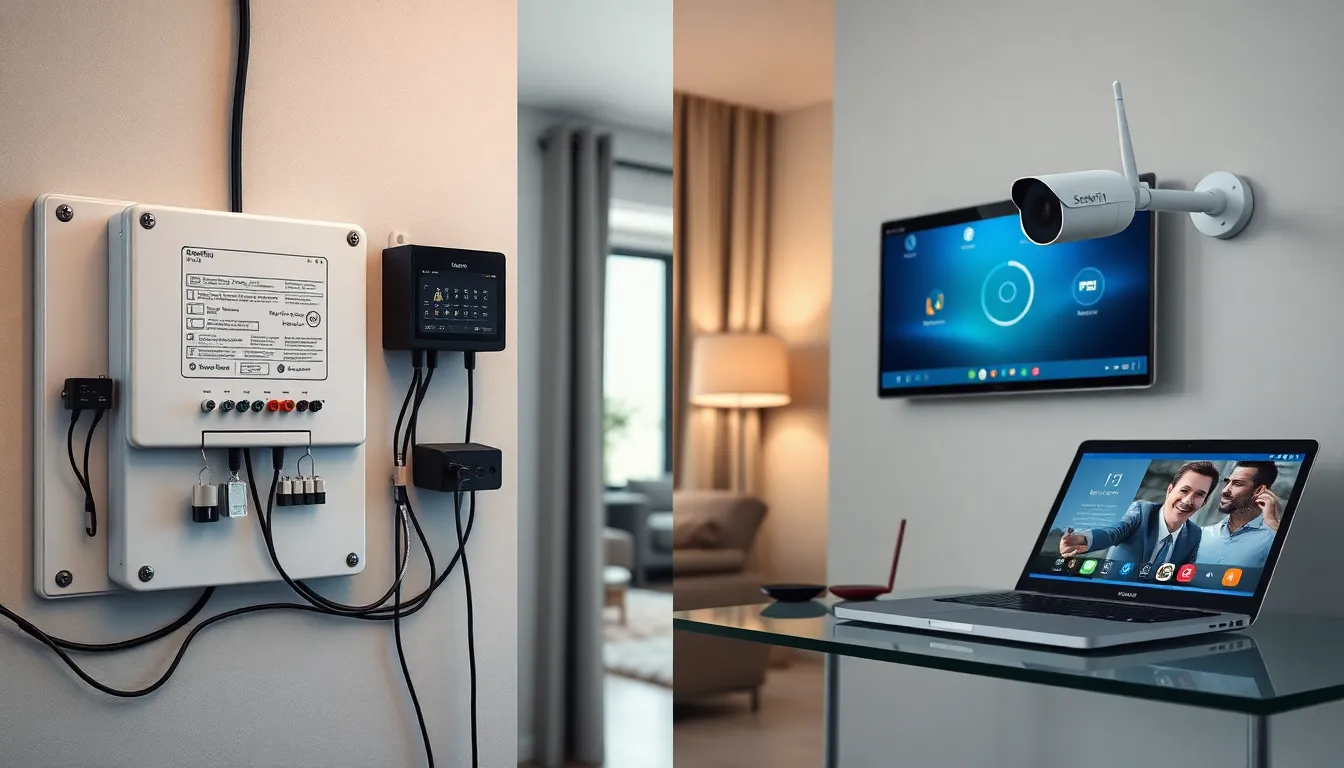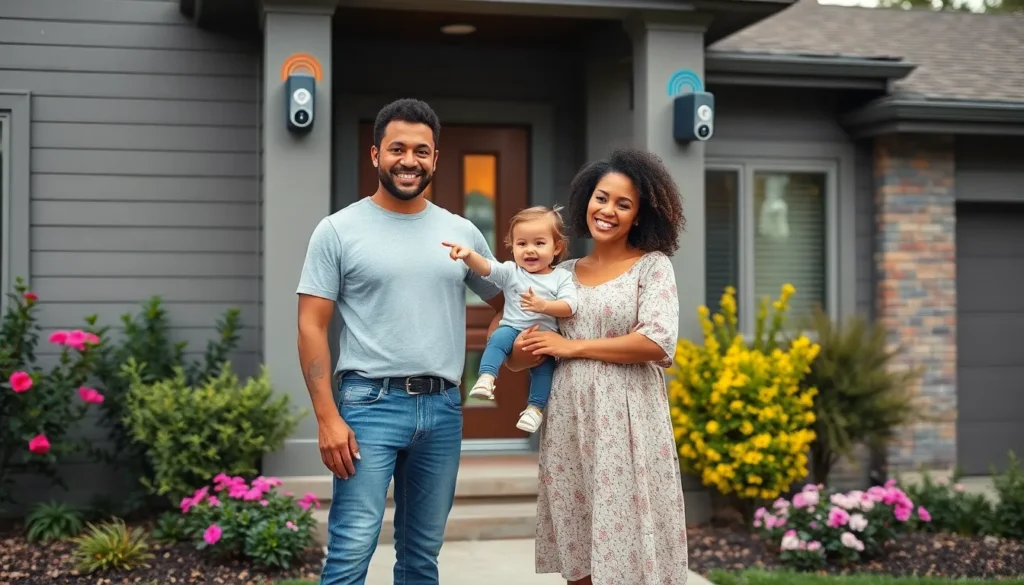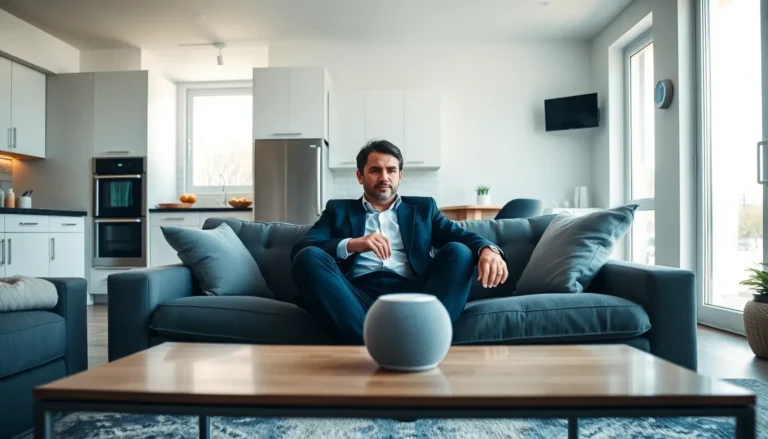In an ever-evolving world, home security systems have become essential for safeguarding loved ones and valuables. With increasing concerns about crime rates and property safety, homeowners are turning to innovative solutions that offer peace of mind. These systems not only deter intruders but also provide real-time monitoring and alerts, ensuring protection even when residents are away.
From smart locks to comprehensive surveillance cameras, the options available today cater to various needs and budgets. Understanding the different types of home security systems can help homeowners make informed decisions, enhancing both safety and convenience. As technology continues to advance, staying informed about the latest trends and features is crucial for creating a secure living environment.
Table of Contents
ToggleOverview of Home Security Systems
Home security systems provide essential protection for properties by deterring theft and enhancing safety. They consist of various components designed to work together, creating a comprehensive defense network.
Types of Home Security Systems
- Monitored Systems: These systems connect to a professional monitoring service. Alerts trigger immediate responses from security personnel.
- Unmonitored Systems: Unmonitored systems notify homeowners directly through alarms or alerts. They rely on self-response from residents.
- Smart Systems: Smart home security uses Internet of Things (IoT) technology, connecting devices, like cameras and motion sensors, to smartphones. Homeowners control and monitor these systems remotely.
- Wired Systems: Wired systems connect directly to a central control panel. They offer reliability but can require more installation effort.
- Wireless Systems: Wireless systems provide a convenient setup through radio frequency. They’re easier to install and expand compared to wired options.
Key Components of Home Security Systems
- Cameras: Surveillance cameras capture real-time footage, helping identify intruders. Options include indoor, outdoor, and doorbell cameras.
- Alarm Systems: Alarm systems activate when unauthorized access occurs. They often feature audible alarms and notifications.
- Sensors: Motion, door, and window sensors detect movement and notify homeowners of breaches. They deliver crucial alerts quickly.
- Smart Locks: Smart locks enhance access control. Homeowners manage entry points remotely and can grant temporary access to trusted visitors.
- Lighting: Security lighting discourages intruders. Motion-activated lights illuminate entryways and dark areas around homes.
Benefits of Home Security Systems
- Crime Deterrence: Signs and visible cameras discourage criminal activity. A well-secured home reduces theft risk.
- Real-Time Alerts: Instant notifications enhance response times, allowing for prompt action during security breaches.
- Insurance Benefits: Many insurance companies offer discounts for homes equipped with security systems. A system can lower premiums significantly.
- Peace of Mind: Knowing that a home is monitored provides reassurance to homeowners. Families feel more secure with advanced protection.
- Remote Access: Homeowners manage and monitor security systems from mobile devices. Remote access enhances control over the home environment.
By understanding the various types, components, and benefits, homeowners can select appropriate security systems tailored to their needs, ensuring a safer living space.
Types of Home Security Systems

Home security systems come in various types, each catering to different needs and preferences. Understanding these categories helps homeowners select the most suitable option.
Wired Vs. Wireless Systems
- Wired Systems: Wired systems connect components through physical cables, offering reliable performance with minimal interference. Installation may require professional assistance. Routine maintenance typically ensures ongoing functionality.
- Wireless Systems: Wireless systems communicate through radio signals, allowing for easier installation and flexibility in component placement. Batteries power these systems, necessitating regular checks to ensure proper operation. Many wireless systems integrate with smart home technology for enhanced control.
Monitored Vs. Unmonitored Systems
- Monitored Systems: Monitored systems connect to a professional monitoring service that alerts authorities during emergencies. Monthly fees apply for this service, which provides 24/7 surveillance and immediate response. Ideal for homeowners seeking comprehensive security solutions.
- Unmonitored Systems: Unmonitored systems rely on the homeowner to act upon alerts, delivering notifications through alarms or mobile apps. No monthly fees contribute to cost-effectiveness, making these systems suitable for budget-conscious individuals. However, the homeowner bears responsibility for responding to any alerts.
Key Features to Consider
When choosing a home security system, specific features significantly enhance overall effectiveness and user experience. Key features include cameras and surveillance, alarm systems, and smart home integration.
Cameras and Surveillance
Cameras provide crucial evidence during incidents and act as a visible deterrent against crime. High-definition cameras with night vision enhance visibility in low-light conditions. Motion detection capabilities allow for immediate alerts and recordings when movement is detected, ensuring timely responses. Wireless options offer flexible placement without requiring extensive installation. Additionally, remote access enables homeowners to monitor live feeds from smartphones or tablets, enhancing peace of mind.
Alarm Systems
Alarm systems alert homeowners and authorities to unauthorized access, serving as an essential first line of defense. Systems often incorporate door and window sensors that trigger alarms upon breach. Customizable settings allow users to choose specific activation times and zones for enhanced convenience. Loud sirens deter intruders and attract attention in emergencies. Some systems integrate with monitoring services for immediate police notifications, offering an added layer of protection.
Smart Home Integration
Smart home integration allows security systems to connect with other devices, enhancing overall functionality. Homeowners can control cameras, alarms, and lights from a single app for streamlined management. Voice control compatibility enables users to manage their security systems hands-free. Automation options allow systems to respond to specific triggers, such as locking doors at a designated time or turning on lights when motion is detected. These features create a cohesive and responsive security environment, making homes significantly safer.
Benefits of Home Security Systems
Home security systems offer various advantages, enhancing safety and security for households. The effectiveness of these systems contributes to peace of mind and a deterrent against criminal activities.
Deterrence of Crime
Home security systems actively deter criminal activities. The presence of cameras and alarm systems signals potential intruders, reducing the likelihood of a break-in. Studies indicate that homes with visible security measures are less appealing targets for burglars. In fact, properties equipped with security systems experience a 300% lower likelihood of burglary compared to those without. Enhanced lighting and motion sensors further exacerbate intruder hesitance. Effective deterrence not only protects property but also preserves personal safety.
Peace of Mind
Home security systems provide significant peace of mind for homeowners. Knowing that loved ones and valuables are under constant protection reduces anxiety and enhances overall well-being. Many modern systems offer real-time alerts via smartphones, allowing prompt responses to any activity detected around the home. Additionally, having a reliable security system can cultivate confidence during travel or extended absences, ensuring that properties remain safeguarded. The integration of monitoring services can further alleviate worries, as professional oversight ensures proactive measures in emergencies.
Investing in a home security system is a proactive step toward safeguarding one’s home and loved ones. With various options available homeowners can tailor their security solutions to fit their unique needs. Staying informed about the latest technologies and features ensures they make the best choices for their safety.
The peace of mind that comes from knowing a home is protected is invaluable. Whether opting for a monitored service or a DIY approach the right system can significantly enhance security and deter potential threats. As crime rates fluctuate being prepared is essential for maintaining a safe living environment.



